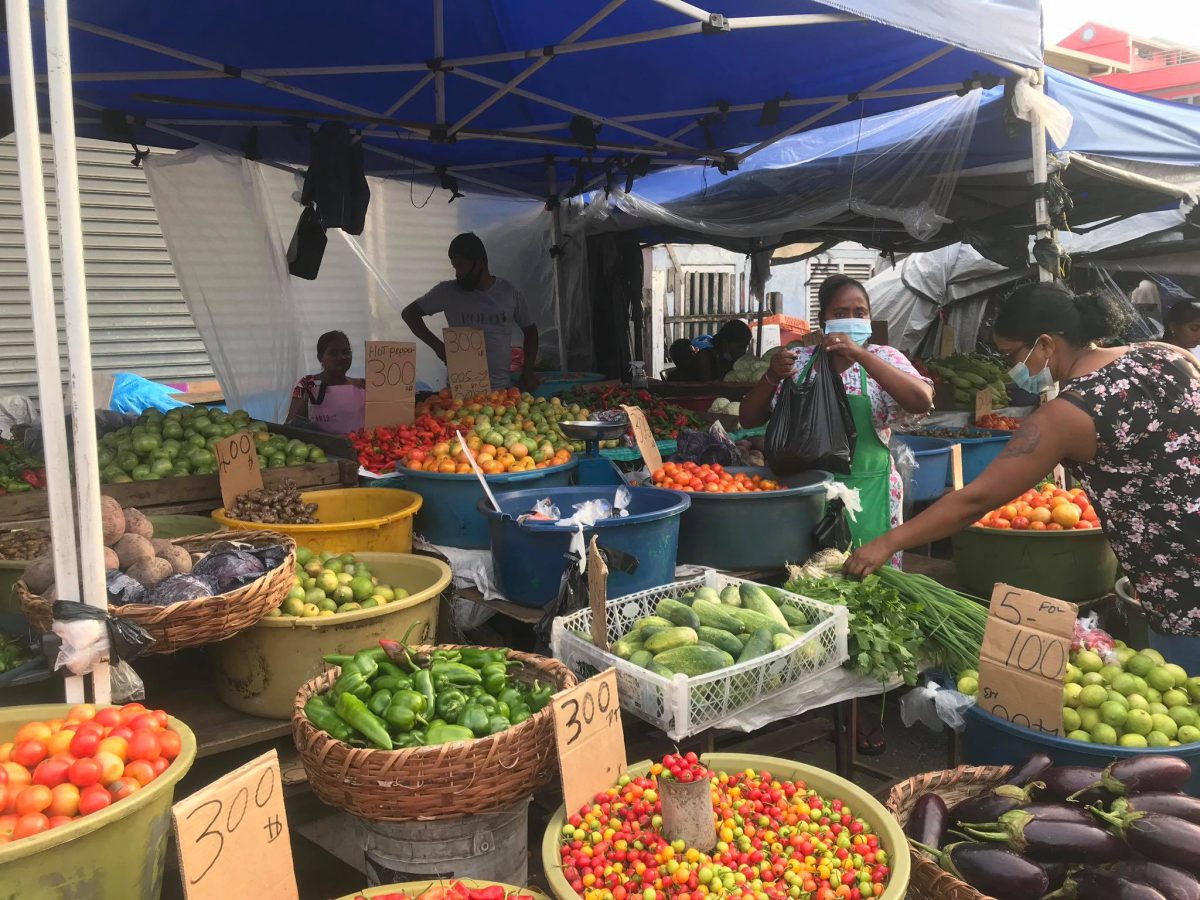Flooding from heavy rainfall in farming areas has triggered increases in vegetable prices at local markets, placing an additional strain on consumers already struggling to cope with rising tariffs for other goods and commodities.
“Groceries was already raised and they say because of shipping and the COVID. Now look, the greens gone sky high too. I only surviving because I have three grown working sons that supplement my income. What happens to everybody else?” Lorna Atkinson asked Stabroek News as she stood in front of a vegetable stand at Bourda Market yesterday afternoon.
Thirteen-year-old Stacy Howes who was assisting her mother to sell at the Bourda market explained the increases.
“The areas that do farming flood out. So whatever little this or that greens that they get, they calling high prices for. We buying everything at more, sometimes twice or five times what it was selling for and we have to make lil profit too. That is why we only taking a little a time we self because people rowing with we and sometimes the things leave back,” she said.
“You see this shallot, we order ten but take five and praying it sell out and don’t leave on we hand. If it hustle off quick, we go back for another five. But people ain’t buying. So sometimes you have to sell back to just get back your money and don’t look at the profit,” her mother added.
At another stall across road, Shawn Rampersaud and his seven-year-old son were also shopping. He lamented the increases but believes that supplies to offshore oil and gas vessels makes it even more difficult now for consumers to bargain for better prices.
“Everything has gone up. You have the flooding and that has sent up the price for greens and so on but everything has gone up. But a fact is that people can’t compete with the companies buying for the oil rigs offshore and they are buying. So while we look at the price for an item and say we the ordinary man can’t pay for that, they can pay and are paying. And they are buying, with ease, that same $1500 lb eschallot.”
Stabroek News over the past week has monitored vegetable and fruit prices at the local markets.
Compared to prices one month ago, almost all vegetable prices have increased. Bora which sold for sometimes $300-$400 per bundle is now between $1000 and $1200. Eschallot which averaged $260-$300 per lb is now between $1000-$1500lb, except for a lone vendor at the corner of Robb and Bourda streets who was selling at $800 per lb yesterday. He confidently shouted to passing potential customers, “Is only I get the deals! Can’t find it better no weh else!”
Local small sweet peppers retail now for $1000 per lb; up by more than $600 from three weeks ago. Boulanger (eggplant) is now 3 for $500 for parcels that would have been $200 last month.
Even pumpkin, which has always remained constant between $200-$300 per slice is now averaging between $400 and $500 for the same-sized slices.
Pak Choy and other types of calalloo are almost non-existent and those few vendors that have start their prices from $400 per parcel of two or three small heads. Okra is between 2lbs for $500 to $350 per pound.
But bountiful in the markets are cucumbers which are selling at 3 and 4 for $100.
Fruits and ground provision vendor Cheryl fondly said, “God has a way of taking care of his own. When everything else dear and sending up yuh pressure, cucumber deh …to help keep de pressure down. Mangoes in season too so yuh eat yuh enjoy yuh fruits to take mind off this madness.”
“If you worry with how dear dear the greens going, all you would do is boil water in yuh pots every day. People ain’t get money and ketching deh tail in a country that full a oil. The effects of the flooding on the farmers is more headache now,” she adds.
Public service minimum wage worker Kaishan waited until this newspaper had finished speaking to a few vendors and said she wanted to make a public appeal to government. “My salary hasn’t increase but everything else has. I would like to ask government to not increase money because they gon say them aint got, but make sure that basic things don’t cost an arm a leg. Things like sugar, rice, flour, milk, oil…de soap powder and bleach and soap and suh. And if they have to make hampers, put them things in it.”
“I want to ask them to focus on helping the farmers first because they will need it more. When them start planting again the price will go back to normal faster and I won’t have to build meh mind every time I have to come to the market,” she added.

